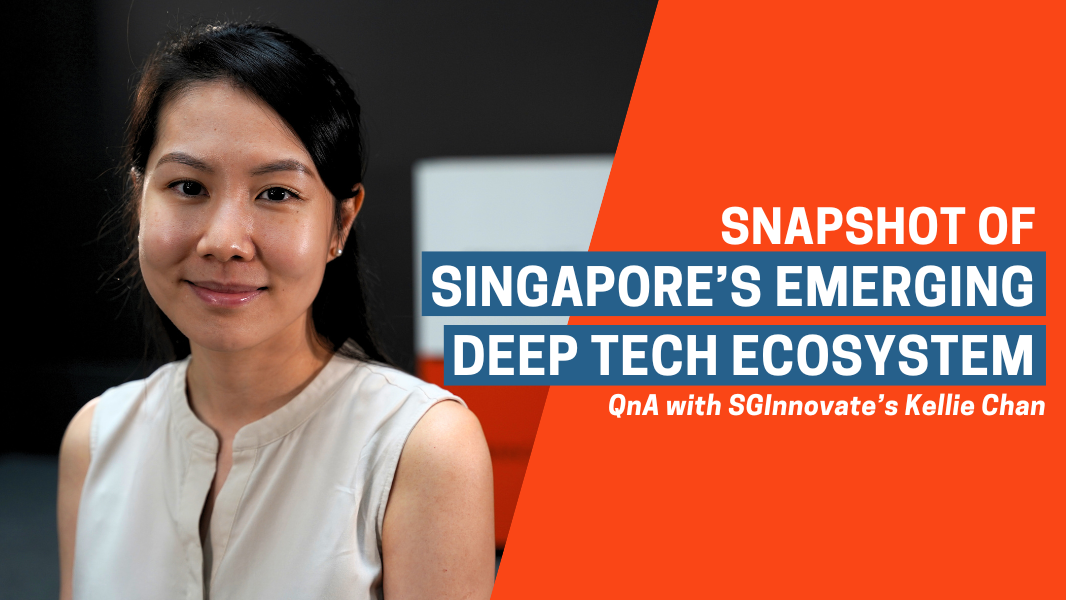Singapore’s Deep Tech ecosystem at a glance
Tue, 07/09/2024 - 12:00
A new report by SGInnovate gives entrepreneurs and investors a bird’s-eye view of Singapore’s deep tech startup ecosystem, highlighting trends, insights, and what to expect.
Download the full report here.
If creating and running a successful startup is challenging, doing the same in the Deep Tech space is doubly so. Apart from a highly competitive landscape for funding and talent, the circumstances in which these startups operate are always shifting – regulatory landscapes evolve, market needs change, and technological advancements continuously redefine the playing field.
Now in its third iteration, SGInnovate’s Singapore Early-Stage Emerging Tech Startup Landscape report examines trends in four verticals – Advanced Manufacturing, Agrifood, Sustainability, and Health and Biomedical Sciences – and provides observations and insights into:
-
Key sources from which emerging tech startups are being spun off
-
Funding activities across the different verticals
-
Trends in startup strike-offs observed over a four-year period
-
SGInnovate's outlook for specific technologies and what ecosystem players should expect.
Here are some key takeaways from our discussion with Ms Kellie Chan, Assistant Director of Corporate Engagements at SGInnovate, who led the team that produced the report.
WATCH: 3 Observations on Singapore's Deep Tech startup scene
1. What is the investment outlook for Singapore’s deep tech ecosystem?
We’ve observed that within the local ecosystem, overall funding rose by 59 per cent from 2022 to 2023 among early-stage startups. We also noticed that there was a one-and-a-half times increase in the number of seed-stage deals compared with 2022. This could be because venture capitalists are seeking earlier stage opportunities, given depressed valuation at the later stages. We see this as a positive sign for encouraging more startups to be incorporated in the foreseeable future.
2. The report identified more than half of the startups incorporated in each vertical as spinoffs from Institutes of Higher Learning (IHLs) or venture studios. Why is this significant?
This achievement showcases the effective translation of research into real-world applications, which further cements the role that IHLs and venture studios play in the origination of early stage emerging tech startups.
We also noticed that the Health and Biomedical Sciences vertical had the highest number of spinoffs at 71 per cent between 2019 and 2023. This could be because of the nature of the sector, which involves heavily regulated products developed as a result of extensive research. This research and development is primarily done at institutions with access to a range of laboratory equipment as well as grant funding.
As Singapore works towards achieving net-zero emissions by 2050, there is a lot of activity concentrated on decarbonisation, especially in the transport sector – from the maritime to aviation to electric vehicle industries.
3. What are some exciting developments ahead in each of the verticals?
Within the Advanced Manufacturing vertical, we believe that the sensors and electronics subvertical will be an interesting area to keep an eye on. We expect exciting developments as there is a move to embed Artificial Intelligence (AI) into sensors and control systems to replace existing rule-based systems in manufacturing lines.
In the Health and Biomedical Sciences space, one area to watch is remote patient monitoring. The convergence of government priorities, advancements in technology, as well as an ageing population are driving an increased focus in this area. This corroborates the rising demand that we see from corporates to be connected with startups offering solutions to help monitor at-risk populations at home, especially for chronic diseases such as cardiovascular illnesses.
Among the four verticals tracked in the report, Sustainability was the only pillar that saw a year-on-year increase in both the number of funding events and funding amounts, with the average seed-size deals more than tripling from 2022 to 2023.
We foresee that this will continue in the future. As Singapore works towards achieving net-zero emissions by 2050, there is a lot of activity concentrated on decarbonisation, especially in the transport sector – from the maritime to aviation to electric vehicle industries.
For the Agrifood sector, prior investments have been predominantly driven by novelty as well as the promise that alternative protein brings to sustainable food production. But one area to look out for is in functional foods and healthier ingredients, given the rise in chronic illnesses and a growing emphasis on preventive care.
4. What are some challenges to be expected and how can startups overcome them?
Given the large number of startups in the Health and Biomedical Sciences sector, it is crucial for startups to be able to articulate a clear value proposition as well as their product-market fit in order to raise funds or acquire customers.
Meanwhile, in the Agrifood space, startups face challenges in scaling up. If companies can overcome these by developing more efficient processes to bring down unit costs and making products more favourable for distribution, storage, and preparation, this could help put an investment case forward.
5. SGInnovate invests in Deep Tech startups, what will the team be looking out for in the year ahead?
SGInnovate will continue to invest in the four verticals we’ve been looking at – Advanced Manufacturing, Agrifood, Sustainability, and Health and Biomedical Sciences. That said, we will also be expanding our areas of interest to include new advancements, such as in Generative AI and Cybersecurity.
Trending Posts
- From satellites to startups, Singapore’s space sector is pushing new frontiers
- How leaders should rethink cybersecurity strategy
- How to Future-Proof a Career in Deep Tech? Start here.
- The future of fusion energy: What will it take to bring the power of the stars to earth?
- Keeping satellites safe: How CYSAT Asia 2026 is tackling space cybersecurity






